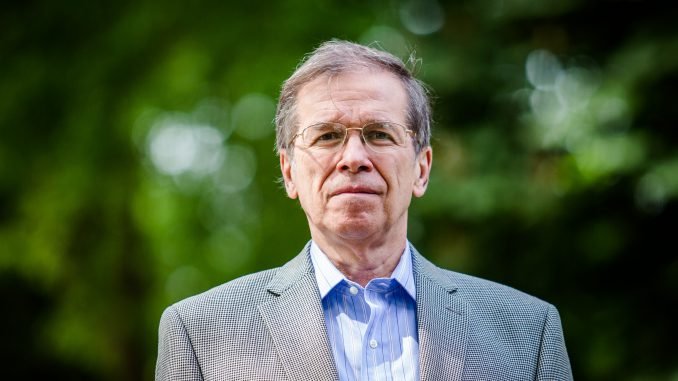
Lithuanian relations with Israel are particularly good compared with many other European Union states. This is laudable, remembering how much local collaborators contributed to the murder of Lithuanian Jews during the Holocaust. But we must not shed principles or overly seek favour in the name of good relations, Kęstutis Girnius writes on LRT.lt.
Lithuania presents itself as carrying out moral policy, always criticising Russia over disregarding international legal norms. But it is silent or indirectly even agrees when Israel continues to build settlements in Palestinian territory despite international law prohibiting occupiers from settling in occupied territory. United Nations Security Council resolutions, resolution 298 and 446 in particular, condemn the construction of settlements, hence also the illegal colonisation of Palestine. Up to 1980 even Washington held the constructions to be illegal.
The Palestinians are no angels either, but you would think that Lithuania, after almost 50 years of occupation, would be more empathetic toward another supressed nation. How quickly things change. During the years of the Sąjūdis, we complained how certain other countries urged us to act moderately, trust in Michail Gorbachev’s goodwill, while now we urge the Palestinians to trust the goodwill of Israeli PM Benjamin Netanyahu despite it being long clear that there’s no goodwill to be found.
This Monday Netanyahu participated in an informal breakfast with EU foreign ministers. This was the first visit by an Israeli head of government at the EU headquarters in Brussels in twenty years. Minister of Foreign Affairs L. Linkevičius was the initiator of the visit for which he was thanked by B. Netanyahu. Not all EU diplomats agreed to the Lithuanian initiative with enthusiasm. The head of EU foreign policy Federica Mogherini, who officially invited the Israeli prime minister, also sent a similar invitation to Palestinian President Mahmoud Abbas – this could be viewed as a light reprimand and reminder that during conflict we must listen to both sides.
I have no doubts that with this initiative L. Linkevičius was aiming to gain B. Netanyahu’s favour. The minister, or at least his staff, must know that current B. Netanyahu is under great pressure. It is suspected that he abused his office, prosecutors have interrogated him regarded this a number of times and if he was prosecuted, he would likely have to resign. Israeli discontent is rising. Last Saturday perhaps ten thousand participated in protests against B. Netanyahu and his government’s corruption. This is not the first such protest. Through his invitation L. Linkevičius threw a float to the capsizing Israeli prime minister.
At least for a brief moment attention was diverted from accusations and investigations. More importantly, B. Netanyahu can present himself as an effective statesman, the most important defender of Israeli interests who received an invitation from the EU which his predecessors did not. Take it as “appreciate your prime minister and calm down”. It is unsurprising that B. Netanyahu publically thanked L. Linkevičius and Lithuania.
Matters don’t always go well. In the person of US president D. Trump, fate spoiled L. Linkevičius and B. Netanyahu’s feast. With the date for the Brussels visit already set, D. Trump made his controversial decision to declare Jerusalem the capital of Israel. If D. Trump’s decision had been released a week earlier, we could guess that the tone and content of the meeting would have been different, more favourable to L. Linkevičius and B. Netanyahu. It is the irony of fate that B. Netanyahu likely received reproach not just for his own, but also for D. Trump’s actions. However it may be, F. Mogherini emphasised that B. Netanyahu should not expect for EU to follow suit to the USA.
After the meeting L. Linkevičius spoke as if a press representative for B. Netanyahu. Supposedly “the most important matter that Israel is aiming for is the right for the Israeli state to exist. Constant rocket fire from the Gaza sector, suicide attacks, terror attacks show that there is no reconciliation and this, according to the Israeli PM is the main reason why there is no conversation.” But there is no “constant” fire from the Gaza sector, suicide attacks or terror attacks are reducing in number in no small part due to effective Israeli security measures. L. Linkevičius could have spared a word or two to point out the problematic, truly unjustifiable actions by Israel, among other things that it has turned the Gaza strip into the possibly largest open air prison in the world. It would be interesting to find out how many 15 year old Palestinian boys and girls have managed to leave the Gaza strip at least once and visit some other place in the world, say Brussels.
When organising the meeting, L. Linkevičius assured that “we are seeking the discussion of issues important to all EU countries and Israel. Direct dialogue is especially important. Only by listening in to arguments presented in the discussions can we seek to coordinate the differing positions.” If it is so important to discuss and come to terms, why not also invit M. Abbas, whose views are less well known than B. Netanyahu’s? It is worth noting that this year L. Linkevičius did not attend the Paris conference on the Middle East, instead sending a vice minister, which was noted in France. Opinions were also expressed there, ones worthy of listening to and not from just one side.
The one-sided support of Israel does not match with the aim to enact moral policy because even the inexcusable actions of Israel are supported. Also the impression is created that the relations are overall unilateral, not bilateral, Lithuania often supports Israel, defends its interests, but how does Israel reciprocate, which Lithuanian diplomatic initiatives does it support? Perhaps my memory is poor, I remember none.
There are also spots of sunlight. For now Lithuania is remaining solidary with other EU states and does not intend to move its embassy to Jerusalem. But how long will the sun continue to shine?

Be the first to comment